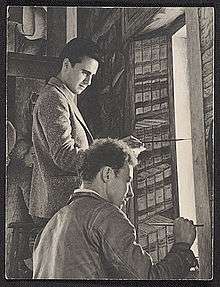Frederick E. Olmsted
| Frederick E. Olmsted | |
|---|---|
| Born |
Frederick Erskine Olmsted Jr. April 10, 1911 San Francisco, CA |
| Died |
February 14, 1990 Falmouth, MA |
| Nationality | American |
| Known for | Artist, Muralist, Sculptor, Scientist |
_up_close_detail.jpg)

Frederick E. Olmsted also known as Frederick "Fred" Erskine Olmsted Jr. (born April 10, 1911 in San Francisco, California - death February 14, 1990 in Falmouth, MA) created many social realism themed murals and sculptures for the WPA, the FAP and public works in San Francisco[1] and later abandoned his art career and became a scientist and biophysicist.[2][3]
Early life
He was the son of Frederick “Fritz” Erskine Olmsted (November 8, 1872 – 1925), a former forest Service employee, published author and advocated for federal regulation over private cutting. His mother was Florence Starbuck du Bois (December 18, 1874) and he had a brother named Julian Olmsted.[4]
Olmsted Jr. studied science at Stanford University,[5] he was a student of Ralph Stackpole's at the California School of Fine Arts (CSFA) (now called the San Francisco Art Institute or SFAI).[5] It was at California School of Fine Arts where he met and later married Barbara Greene.[5]
Career
Olmsted Jr. worked in the WPA, assisting John Langley Howard and George Albert Harris in their Coit Tower murals in San Francisco, and creating his own mural on a three-foot panel called "Power" above the main entrance.[1][5] He also assisted Diego Rivera with his mural at the Art Institute in San Francisco with the theme building a city.[6] Olmsted painted a window archway called "Pottery" in the Anne Bremer Memorial Library at SFAI.[5]
Olmsted Jr. painted the "Theory and Science" mural located at City College of San Francisco (CCSF) in the science building, west entrance in 1941.[5] In 2002, CCSF staff, students and restoration professionals restored the mural. This mural depicts a range of careers in the sciences, featuring both men and women doing things such as viewing bacteria through a microscope, conducting field research, and excavating dinosaur remains.[5]
Olmsted Jr. created two large sculptures that stand 7 feet high, four foot square, and of 9 tons of granite, representing Leonardo da Vinci and Thomas Edison for the 1939-1940 Golden Gate International Exposition on Treasure Island.[1] These sculptures were carved for the WPA exhibition “Art in Action”. Art in Action was an exhibit of artists at work displayed for four months in the summer of 1940. When the Golden Gate International Exposition was over, the sculptures were donated to CCSF and are currently on display at the CCSF Ocean Campus.[1]
He taught art for a few years at Arts and Crafts in Oakland (now called California College of Art or CCA).[1]
After Barbara and he divorced, he continued to work as a sculptor, and became more interested in studying science. He later abandoned his art career and became a scientist at Yale University and later a biophysicist at the Cleveland Clinic.[2] He designed medical equipment for the Cleveland Clinic and it was there he developed a machine to shock the diseased heart of one of dogs, a prototype for today’s pacemaker.[1] Olmsted then worked at Woods Hole, Massachusetts, designing equipment for the Oceanographic Institute.[1]
He died in Falmouth, Massachusetts on February 14, 1990.[2]
See also
- Art in Action, the art exhibition at the Golden Gate International Exposition (GGIE) funded by the WPA
- City College of San Francisco, current location of much of Olmstead's art from the GGIE
- Ralph Stackpole, Olmsted's artistic mentor
References
- 1 2 3 4 5 6 7 "Edison and DaVinci by Olmsted". ArtAndArchitecture-SF.com. Retrieved September 25, 2014.
- 1 2 3 "Frederick Erskine Law, Jr. Olmsted (1911 - 1990)". www.askart.com. Retrieved September 25, 2014.
- ↑ Milton Hughes, Edan (2002). Artists in California, 1786-1940: L-Z, Volume 2. Sacramento: Crocker Art Museum. pp. 832–833.
- ↑ Newfield, Elsbeth (2006). "773 Dolores (11 Dolores), 1917, Shingle style house" (PDF). Stanford Historical Society. Retrieved September 25, 2014.
- 1 2 3 4 5 6 7 "Public Art On Campus, Murals". City College of San Francisco (CCSF). Retrieved September 25, 2014.
- ↑ Brechin, Grey (2012). "City College of San Francisco "Theory and Science" Mural – San Francisco CA". The Living New Deal. The Living New Deal, Department of Geography at UC Berkeley. Retrieved September 25, 2014.